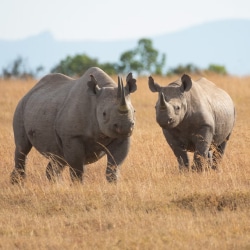Rhino Poaching On Increase in South Africa

It has been reported that 259 rhinos have been killed for their horns in South Africa during the first 6 months of this year.
Sadly poaching is still a critical threat to rhinos as their horns remain in demand within Asian medicine. Poaching is big business, and crime syndicates operate within South Africa to satisfy the demand. However, there has been a shift in where the rhinos are being poached.
Private reserves being targeted
Previously the larger parks such as the Kruger have been targeted for poaching rhino. Now, the poachers are focussing their efforts on the smaller private reserves. Those found in the KwaZulu-Natal region have been heavily hit.
With smaller reserves being hit the government in South Africa is being called upon to support the private reserves and provincial authorities.
More rhinos killed this year
There have been 10 more rhinos killed in the first six months of this year compared to last. 82 were poached for their horns in Kruger National Park. 210 were killed on state properties and 49 from privately owned parks. The most significant rise was 133 taken from KwaZulu-Natal which was a huge difference to the 33 rhino killed last year in same time period.
Increase in poachers arrested
On the flip side, there has been an increase in the number of arrests and prosecutions. That illustrates the successful collaboration between difference law enforcement agencies and security personnel within the private parks.
Two rangers arrested
69 people were arrested in connection with rhino poaching. 13 were arrested in Kruger. Two of those 13 were rangers which obviously had a significant impact on the rhino poaching activities within the park, and sends out a strong message that illegal activities will be severely punished.
There have been 51 convictions following the arrests. The heaviest sentence handed out was 34 years imprisonment, and others received over 20 years in prison.
Military operation
The arrests of rangers highlights the ability of the crime syndicates to infiltrate those that serve to protect the rhinos. The syndicates offer financial reward or threaten the ranger’s families. Being a ranger has become less about conservation more about being part of a military operation acting against the criminal gangs.
If you would like to find out more about rhino conservation please visit our Adopt A Rhino page.



